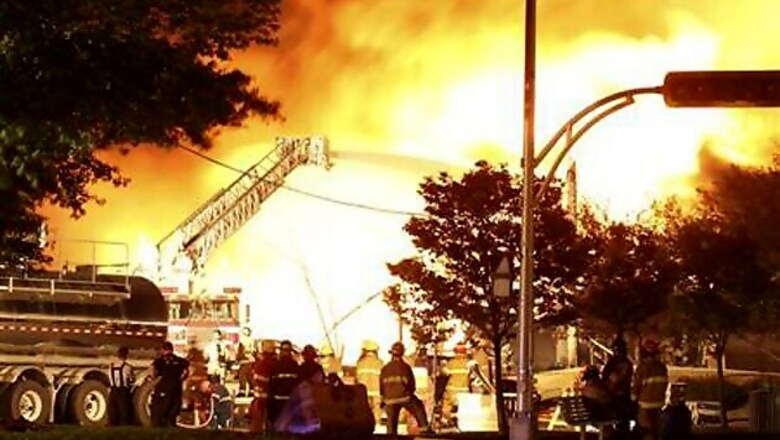
views
The death toll in Quebec's oil train disaster jumped to 13 people on Monday and police said about 37 more people were missing, a sign the derailment and explosion could be the worst accident in Canada since the Swissair crash of 1998.
Police said they estimated a total of around 50 people were either dead or missing after the gigantic blast destroyed dozens of buildings in the center of Lac-Megantic early on Saturday.
Previously they had said five people were dead and 40 were missing. Given the devastation in the town center, few residents expect any of the missing to be found alive.
The coroner's office asked relatives of the missing to bring in toothbrushes, hair brushes, combs and razors so specialists could extract DNA samples from strands of hair.
If the death toll does hit 50, that would make it Canada's deadliest accident since 229 people died in 1998 when a Swissair jet crashed into the sea off eastern Canada.
Asked when authorities would declare the missing people dead, police spokesman Benoit Richard replied: "When we find the bodies."
The runaway oil tanker train derailed in the town of 6,000 people shortly after 1:00 a.m. on Saturday, causing a huge explosion and deadly ball of flame.
Air brakes that would have prevented the disaster failed because they were powered by an engine that was shut down by firefighters as they dealt with a fire shortly before the calamity occurred, the head of the railway that operated the train said on Monday.
The train had been parked at a siding on a slope near the town of Nantes, which is 12 kilometers (8 miles) west of Lac-Megantic. The volunteer Nantes fire service was called out late on Friday night to deal with an engine fire on one of the train's locomotives.
Nantes Fire Chief Patrick Lambert told Reuters the crew had switched off the engine as they extinguished a "good-sized" blaze in the engine, probably caused by a fuel or oil line break in the engine.
BRAKES FAILED, SAYS CHAIRMAN
The problem was that the engine had been left on by the train's engineer to maintain pressure in the air brakes, Ed Burkhardt, chairman of Montreal, Maine ~~amp; Atlantic Railway (MMA), said in an interview. As the pressure gradually "leaked off," the air brakes failed and the train began to slide downhill, he said.
The fire service said it contacted a local MMA dispatcher in Farnham, Quebec, after the blaze was out. "We told them what we did and how we did it," Lambert said.
Asked whether there had been any discussion about the brakes, he replied: "There was no discussion of the brakes at that time. We were there for the train fire. As for the inspection of the train after the fact, that was up to them."
It was not immediately clear what the MMA dispatcher did after speaking with the fire service. Burkhardt said the fire service should have also tried to contact the train's operator, who was staying at a nearby hotel.
"If the engine was shut off, someone should have made a report to the local railroad about that," he said.
Andre Gendron, 38, lives on a wooded property next to the rail yard in Nantes. He said he was burning a campfire outside his trailer on Friday night when he heard the fire trucks.
"About five minutes after the firemen left, I felt the vibration of a train moving down the track. I then saw the train move by without its lights on," Gendron told Reuters.
"I found it strange its lights weren't on and thought it was an electrical problem on board. It wasn't long after that I heard the explosion. I could see the light from the fires in Lac-Megantic."
Federal Transport Minister Denis Lebel said inspectors from his department had examined the locomotive on July 5, the day before the disaster, and found nothing wrong.
Canadian crash investigators say they will look at the two sets of brakes on the train: the airbrakes and the handbrakes. Members of the team are due to speak to reporters at 10 am (1400 GMT) on Tuesday.
Burkhardt said that after the pressure leaked out of the airbrakes, the handbrakes would not have been strong enough to keep the train in place.
During the course of the day police relaxed the security perimeter around the center of Lac-Megantic, a lakeside town near the border with Maine. Authorities said that over the next few days around 1,500 of the 2,000 people who had been evacuated would be allowed to go back home.
One of the destroyed buildings was a music bar popular with young people, and witnesses reported fleeing the area around the building as the heat and flames closed in.
Montreal Maine ~~amp; Atlantic is one of many North American railroads that have vastly stepped up shipments of crude oil as pipelines from North Dakota and from oil-producing regions in Western Canada fill to capacity, and the accident is bound to raise concern about the practice of transporting oil by rail.




















Comments
0 comment